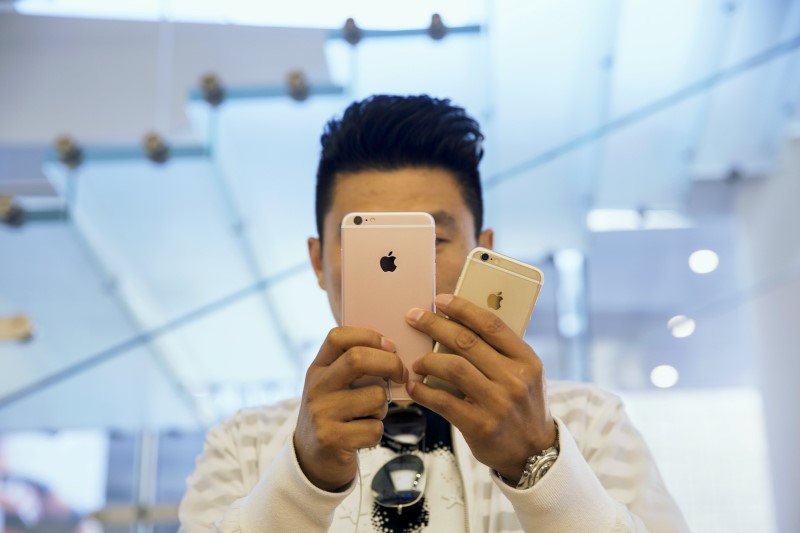By Venus Wu and Sijia Jiang
HONG KONG (Reuters) - In an empty mall that once bustled with trade in high-end smartphones, a Hong Kong shopkeeper sits surrounded by boxes of Apple Inc (O:AAPL) headphones, grumbling that business is grim - a domino effect of lackluster demand from mainland China.
In recent years, hundreds of thousands of Apple devices were smuggled across the border into mainland China, where they could change hands for as much as four times the price in Hong Kong.
But much of that trade has been wiped out as Apple has opened more mainland stores, recent new phone launches have been simultaneous in China and Hong Kong rather than staggered, and local phone brands have increased their share of the world's biggest smartphone market.
"I want to do something else, make a change," said the shopkeeper amid dozens of shuttered stores. "Relying on iPhones can barely help you make a living now. You can't really earn much money."
He didn't want to be named as he resells phones to so-called parallel traders - who buy goods in Hong Kong to sell at a profit across the border.
After 10 years selling phones, the shopkeeper said parallel traders now account for less than half his business, down from 80-90 percent previously. Traders now sell as much to the Middle East and Russia, he said.
His tale reflects a broader trend in Hong Kong; the demise of the city's role as a middleman selling everything from formula milk and iPhones to mainland Chinese concerned about food safety or eager to quickly get their hands on high-tech gadgets.
LOSING STEAM
On an earnings conference call on Tuesday, Apple CEO Tim Cook blamed Hong Kong for a 10 percent drop in third-quarter greater China revenue, noting a drop in mainland tourists to Hong Kong and the local currency's peg to the U.S. dollar.
He said mainland China revenue grew 6 percent in adjusted currency terms. Data from industry analysts showed Apple's phone shipments declined.
iPhone shipments in China declined year-on-year for a second straight quarter, according to Canalys, a consultancy, adding shipment volume dropped 12 percent in April-June from last year, and 14 percent from the previous quarter.
"People are waiting for the next iPhone. We expect shipments to rebound in Q3 and Q4 ... Revenue from iPad and MacBook sales made up for dropping iPhone sales," said Canalys analyst Mo Jia.
In China, Apple's market ranking has slipped to fifth, overtaken by local brand Xiaomi, noted Strategy Analytics, and China's Huawei is now just 3 million phones away from overtaking Apple as the world's No.2 global smartphone vendor after Samsung Electronics (KS:005930).
According to Canalys' tracking of smartphone shipments, Apple's iPhone shipment volume in Hong Kong represented 4.5 percent of that in mainland China in the latest quarter, down from 33 percent just two years ago.
In 2009, when there was just a single Apple store in mainland China, Apple shipped more phones to Hong Kong than to the mainland - though many of those found their way across the border in what was a profitable trade for smugglers, and tourists.
"Chinese consumers increasingly favor Chinese brands, and Apple is no longer as fashionable in China as it was," said Neil Mawston, an analyst at Strategy Analytics analyst.
He added that the next iPhone, expected later this year, should give Apple a bounce, but "the outlook for Apple in China remains very challenging."
For graphic on Apple earnings click: http://fingfx.thomsonreuters.com/gfx/rngs/1/1419/2253/index.html
